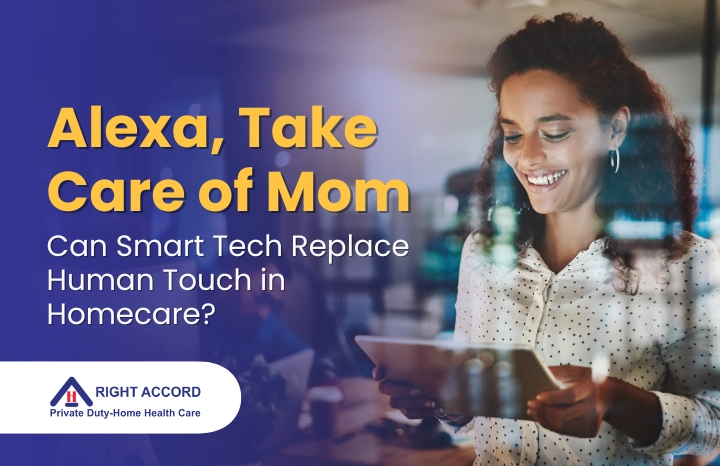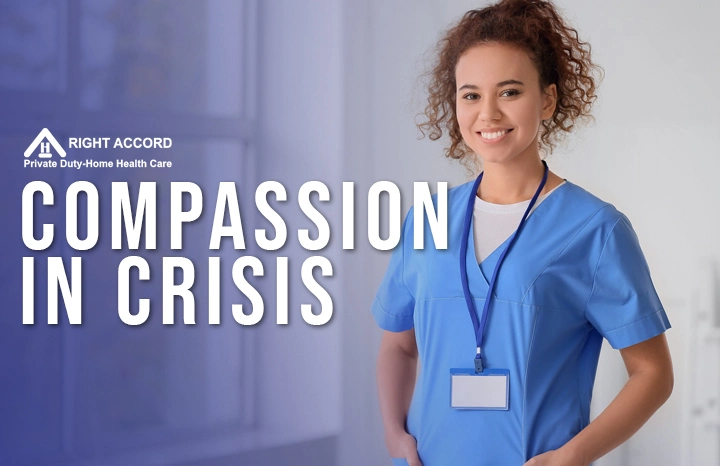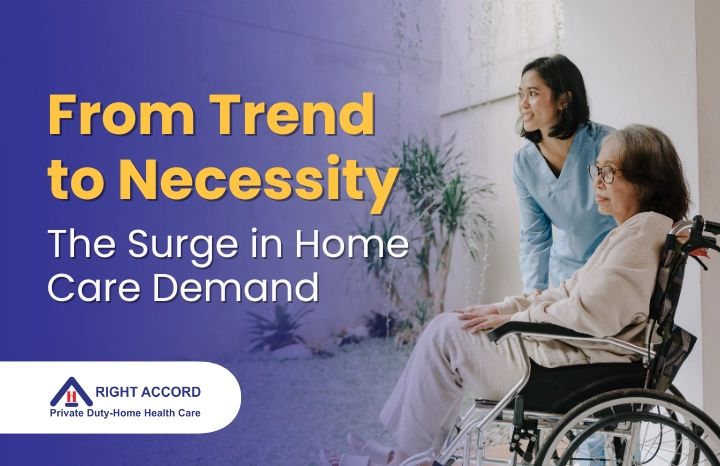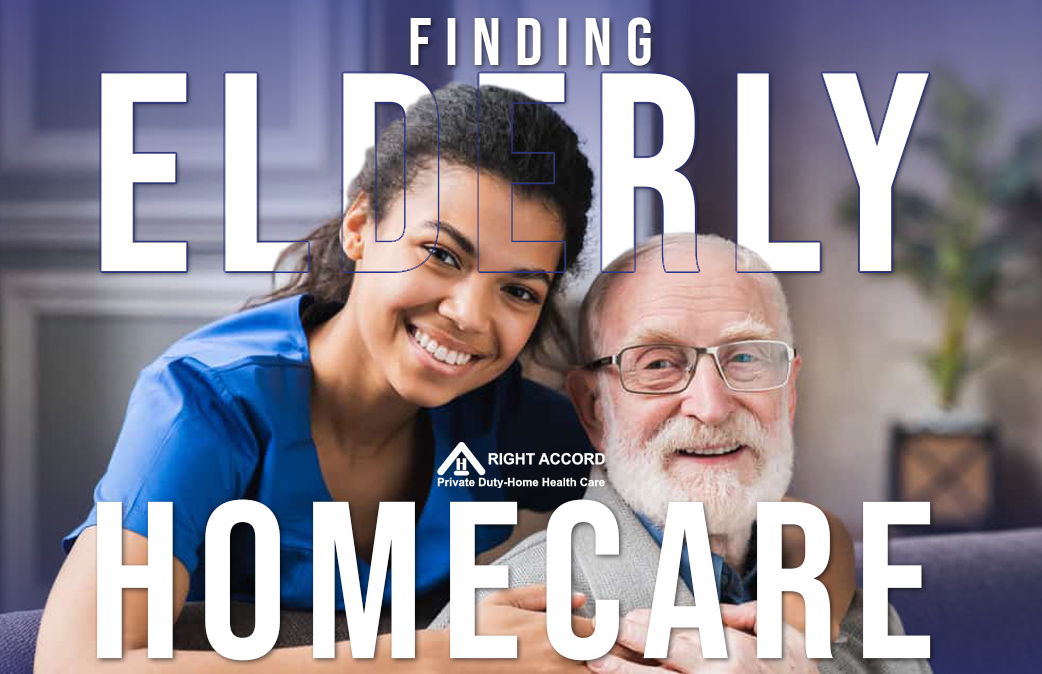· 4 min read
Alexa, Take Care of Mom: Can Smart Tech Replace Human Touch in Homecare?
Smart home devices like Alexa, Google Assistant, and Siri have revolutionized the way we live. From setting reminders to turning on the lights, these voice-activated helpers are now being considered for a much deeper role—caring for our aging loved ones.

A Modern Dilemma
Smart home devices like Alexa, Google Assistant, and Siri have revolutionized the way we live. From setting reminders to turning on the lights, these voice-activated helpers are now being considered for a much deeper role—caring for our aging loved ones.
But here’s the question: Would you really trust Alexa to take care of your mom?
The growing use of artificial intelligence (AI) and voice assistant technology in homecare is sparking debate across families, professionals, and ethicists. Can a smart device provide the same warmth, understanding, and critical support as a trained human caregiver?
Let’s explore both sides of the argument.
🏠 The Rise of Voice Assistants in Senior Care
Voice-activated devices are making a big impact in senior homes. Here’s how:
- Reminders for medication, appointments, hydration, and meals
- Emergency alerts and fall detection with smart sensors
- Hands-free calling and communication with family
- Entertainment and social connection via music, news, and games
- Controlling smart home features like lights and thermostats
The appeal is obvious: they offer convenience, safety, and cost-efficiency. But there’s a deeper conversation to be had.
🤖 The Argument For Smart Tech in Homecare
- 24/7 Availability: Unlike human caregivers, devices don’t sleep, get sick, or take breaks. They’re always “on” and ready to assist.
- Affordability: A one-time investment in a device may be cheaper than hiring round-the-clock care—especially for families with limited resources.
- Encouraging Independence: Seniors can maintain autonomy by managing tasks through voice commands, reducing their dependency on others.
- Support for Caregivers: Voice assistants can act as “extra eyes and ears,” giving human caregivers more bandwidth to focus on direct care and emergencies.
😟 The Argument Against Smart Tech Replacing Human Aides
- Lack of Emotional Connection: No matter how advanced, a voice assistant can’t provide empathy, shared laughter, or a comforting touch. Companionship is a major component of senior well-being.
- Limitations in Emergency Situations: While some devices can call for help, they can’t perform CPR, lift someone who’s fallen, or assess pain levels. Humans can.
- Privacy & Security Concerns: Smart devices are always listening. For some, that’s a red flag, especially when sensitive health information is involved.
- Risk of Over-Reliance: Families might assume a smart device is “enough”—and reduce human interaction too much. This could lead to loneliness, depression, or missed signs of decline.
🔍 Real-World Examples of Tech in Homecare
- Amazon’s Alexa Together. A subscription service that connects aging loved ones with family caregivers, offering fall alerts, activity monitoring, and urgent response services.
- Google Nest + Sensors. Paired with motion detectors and smart cameras, families can check in remotely without disturbing the senior’s routine.
- Wearables like Apple Watch or Lively. Mobile These tools offer fall detection, heart rate monitoring, and emergency SOS calls.
They all enhance care—but they don’t replace it.
💡 A Balanced Perspective: Tech + Human Touch
Rather than asking “Can Alexa replace a caregiver?” maybe the better question is:
How can smart tech support—but not substitute—quality human care?
At RIGHT ACCORD Private Duty – Home Health Care, we believe in blending innovation with compassion. Our caregivers are trained to work alongside modern technologies, using tools like voice assistants and safety monitors to enhance—not replace—the personal care experience.
🧓👩⚕️ What Human Care Still Does Best
- Provides physical assistance with bathing, dressing, and transfers
- Builds emotional trust and companionship
- Reads subtle signs of pain, confusion, or distress
- Offers comfort during hard moments
- Advocates for clients when they can’t speak for themselves
These are things Alexa can’t—and may never—do.
🛠️ How Families Can Use Smart Tech the Right Way
- Supplement human care, especially during caregiver breaks or overnight hours
- Use reminders and alerts to help seniors stick to routines
- Stay connected with family through video calls and messaging apps
- Promote safety with motion sensors and smart home features
- Engage seniors with music, trivia, and storytelling capabilities
Pairing these tools with trained in-home support leads to the safest, most connected form of aging in place.
📣 Let’s Talk About What’s Best for Your Family
At RIGHT ACCORD, we understand that no two families are the same. That’s why we build customized care plans that fit your loved one’s needs, goals, and comfort levels—with or without smart tech.
Need human care with heart and high standards? Let us be your trusted partner.
📞 Call us at 941-366-0801
🌐 Visit www.rightaccordhealth.com
We proudly serve Sarasota, Venice, Manatee, Lee, and Charlotte Counties.
Let’s find the perfect balance of compassion and technology—together.



